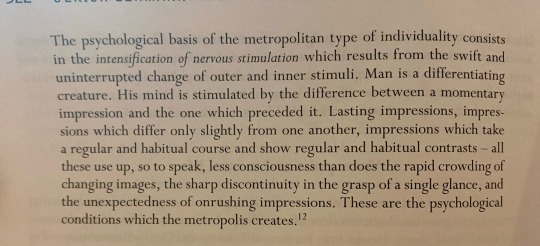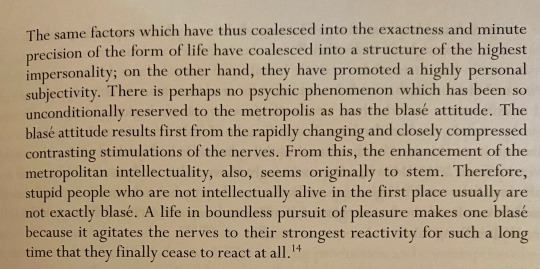#georg simmel
Text
Yet it is possible too that something outweighs all these gains and
turns them into a net loss, namely two of the greatest evils of our modern feeling for art: superficiality and the blasé attitude. It is easy to look at things calmly and coolly when the brain is so benumbed as to be blank to warmth or enthusiasm. It is easy to guard against overestimation when nothing is esteemed at all any longer. It is not hard to criticize the bad when criticism is the only way to respond even to the good. A blasé attitude is both cause and consequence of this need for the most varied and discordant of impressions. For as the mind becomes duller with each satisfaction of its craving, it thirsts only for more and more violent and arousing excitements. A curious contradiction arises: as our sensibilities as modern people become finer, more tender, and more nervous, we cease to be able to live with strong contrasting colors and henceforth cope only with pale ones, with half- tones and tints, like modern parents with the healthy noise of their children. Our emotive and expressive powers taper down to such a degree that our feelings seem henceforth capable only of dancing at pinpoint, as at the tips of needles. The tiniest deviation from a style or the slightest tactlessness upsets us ever more easily.
Certainly we learn to discriminate more and more sharply, where untrained eyes and thicker skinned spirits see nothing but a blur. Yet we also crave ever greater excitements and are ever less content with small daily pleasures and interests, ever less open to the idyllic life, with the consequence that nature can satisfy us only at the coast of the Baltic Sea or at the highest peaks of the Alps. Sophistication is always as much a sign of the blunting of sensibility as of its refinement, and modern man’s impulses tend to want just as much to find the sensuously rare, peculiar, and delicate as to expand the scope of sensibility as such— coming finally, through this process, to need only more and more violence and exhilaration.
Georg Simmel, On Art Exhibitions
#georg simmel#philosophy#excerpts#mine#the pseuds and the tenderqueers are the same people pass it on
13 notes
·
View notes
Photo

«Ahora giro las velas y busco una tierra todavía no pisada. El viaje podrá incluso concluir antes de alcanzar la costa. Al menos no me sucederá como a muchos de mis compañeros, que se encuentran tan cómodos en su nave que llegan a pensar que la nave misma sea la tierra buscada»". Carta de Georg Simmel a Marianne Weber, 1912:
21 notes
·
View notes
Text

.@goodreads #bookoftheweek Simmel, G. Filosofía de la moda.
(27-04-2023)
#georg simmel#filosofía#de la#moda#fashion#philosophy#simmel#libro#book#cover#portada#good reads#que leer#babelia#spring#2023
3 notes
·
View notes
Photo

Jeanne Lazarus Dire:
“Ce que Georg Simmel explique c’est que l’argent est à la fois perçu comme allant contre l’authenticité de la vie, détruisant toutes les valeurs morales, religieuses, etc.
Mais c’est aussi ce qui donne la liberté. Et c’est ce qui permet aux membres de la société les plus extérieurs, les plus marginaux, de trouver leur place.
Parce que ce qu’explique Simmel c’est que quand on a rien, qu’on n’a pas de ressources, qu’on est vu comme un paria, la seule façon de pouvoir rentrer dans une société, c’est par l’argent.
Il s’est beaucoup intéressé à la place des Juifs, mais c’est quelque chose qu’on retrouve dans le monde entier.
Les groupes les plus parias dans une société sont ceux à qui on donne la gestion de l’argent. Mais aussi ceux qui n’ont que cela pour pouvoir s’élever.
C’est toute la question des nouveaux riches, par exemple, qui sont toujours perçus comme étant vulgaires, comme n’ayant que l’argent, n’ayant pas l’épaisseur de la qualité humaine que les vieilles familles riches ont construite au cours de générations.
Les nouveaux riches souvent en rajoutent dans une sorte de provocation pour dire: peut-être que vous nous trouvez pas aussi bien que vous, sauf que notre argent fait que vous nous acceptez chez vous.
La force de l’argent c’est que même si je suis laid, on me trouvera beau. Tout ce dont on était rejeté, tout ce à quoi on n’avait pas accès, tout d’un coup on peut l’avoir parce qu’on a de l’argent.
C’est quelque chose qui est à la fois vu comme immoral, mais qui peut aussi être vu comme moral au sens révolutionnaire.
Car si ce n’est pas l’argent qui donne les places sociales, alors c’est la naissance. Donc l’argent a ce caractère transformateur.”
Source: Sans oser le demander: Ça te dérange si je te demande combien tu gagnes ?
3 notes
·
View notes
Text
youtube
TODAY IN PHILOSOPHY OF HISTORY
Simmel and Extra-Theoretical Interests in History
Friday 01 March 2024 is the 166th anniversary of the birth of Georg Simmel (01 March 1858 – 26 September 1918), who was born in Berlin on this date in 1858.
Simmel made a distinction between theoretical history and speculative history, and then undercut his distinction in favor of history and its metaphysics being integral to each other, but he also examined the difference between various extra-theoretical interests in history, which include axiological (aesthetical and ethical) interests and teleological interests. Simmel argues that these extra-theoretical interests can be treated in isolation from each other, which overturns a conception of the coincidence of value and purpose that has been around since Aristotle.
Quora: https://philosophyofhistory.quora.com/
Discord: https://discord.gg/r3dudQvGxD
Links: https://jnnielsen.carrd.co/
Newsletter: http://eepurl.com/dMh0_-/
Podcast: https://podcasters.spotify.com/pod/show/nick-nielsen94/episodes/Simmel-and-Extra-Theoretical-Interests-in-History-e2ggbc2
0 notes
Text
Books On Books Collection - Alastair Noble
Books On Books Collection – Alastair Noble
In Memoriam+ (2021)
In Memoriam+ (2021)Alastair NobleBooklet thread-bound to HMP boards, cover with cutout. H210 x W205 mm, 12 pages. Edition of 22, of which this is #4. Acquired from the artist, 25 April 2021.Photos of the work: Books On Books Collection. Displayed with permission of the artist.
This work pays tribute to Ian Hamilton Finlay, whose Little Sparta, a garden across seven acres in…

View On WordPress
#Alastair Noble#Amereida#Gary Hincks#Gaston Bachelard#Georg Simmel#Ian Hamilton Finlay#Manuel F. Sanfuentes Vio#Martin Heidegger#Open City#Ovid#School of Architecture of the Catholic University of Valparaíso
0 notes
Text
I live in the most populated neighborhood of my city (almost 80K people live in this neighborhood, if you want numbers). Some may dislike being around so many people (8K inhabitants/Km²) but I love that it's never empty. That you can go out at any hour of the day and there will be at least one other person around. One thing I love about it is this market where they sell farmer's produce but also other food and clothes (used and new), shoes. Anything you want, you'll find it here. It's like having a mall that appears in the morning and leaves at lunch time (there are stalls as well as little buildings with shops). I love going out to buy pizza whenever I want or dark chocolate pralines when I crave them. I love living in a metropolitan city and I consider myself a city person. I wonder how I would fare in a little town. I've often wondered about it. Because being around people doesn't mean being seen or being more social. You can feel alone in a crowd... but when there isn't a crowd either? Quietude terrifies me a bit.
#Tweety.txt#writing this post made me think about the essay “The Metropolis and Mental Life” by Georg Simmel#he said that the person living in the metropolis is a “blasé” individual who rarely creates deep bonds with others#and it is in stark comparison to the little city/countryside person who is more attentive
4 notes
·
View notes
Text

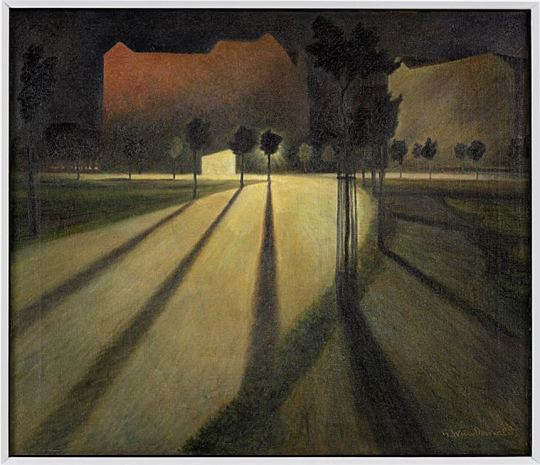
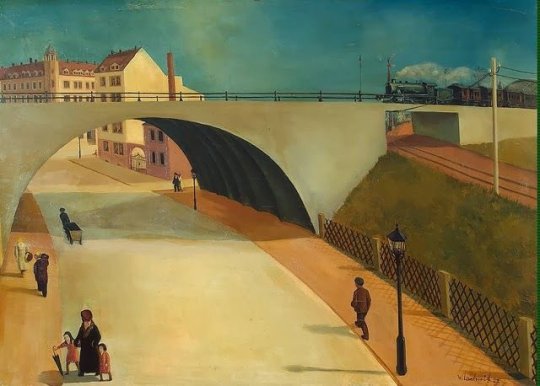
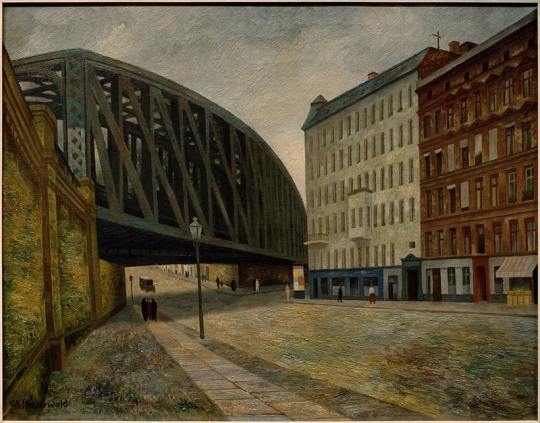
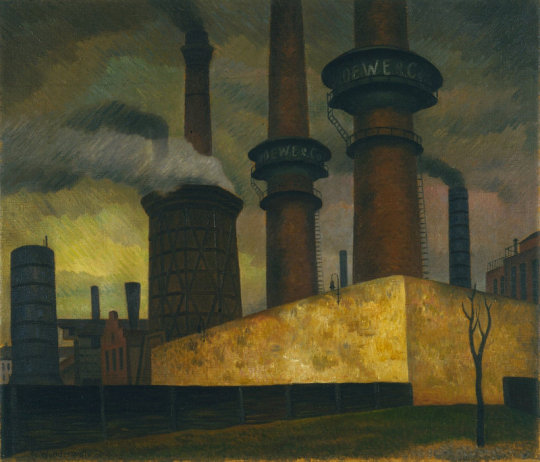
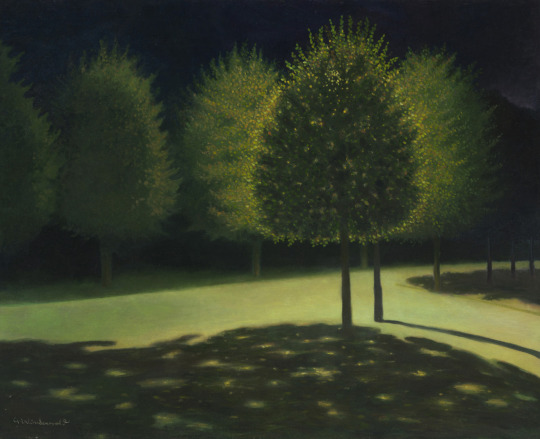
Gustav Wunderwald’s Paintings of Weimar Berlin.
The landscape painter Gustav Wunderwald (1882 - 1945) died from water poisoning in a hospital in the western suburb of Charlottenburg, Berlin. He was sixty-three years old.
Born in Kalk, an industrial suburb on the outskirts of Cologne, Wunderwald experienced first-hand the modern, industrialised city from a young age. Showing early signs of a proficiency in painting, he undertook a two-year apprenticeship under the guidance of the painter Wilhelm Kuhn. Wunderwald quickly found his niche in theatrical and stage set design, taking a job as a scenery painter in Gotha in 1899. For the next thirteen years, his skills led him through a succession of jobs in a variety of cities. After a year in Gotha, he spent four years in Berlin (1900–1904) working at the studio of Georg Hartig and Company, where he specialised in theatrical set painting. From Berlin, Wunderwald moved to Stockholm, and then onwards to Düsseldorf, Innsbruck, and Freiberg over the course of the next eight years, before moving back to Berlin in 1912 to work as a stage designer at the German Opera House.
Wunderwald’s paintings of Berlin’s working-class neighbourhoods have an enigmatic quality about them. They employ a sooty palette of warm browns and greys, and have a stillness and architectural solidity to them that can perhaps be accounted for by the artist’s prior experience as a painter of theatrical scenery. One could well image scenes such as Fabrik von Loewe & Co. or Brücke über die Ackerstraße as backdrops to theatrical adaptations of Weimar-era novels like Alfred Döblin’s Berliner Alexanderplatz, Hans Fallada’s Little Man What Now?, or Christopher Isherwood’s Goodbye to Berlin.
Amidst the tenement blocks, factories, smokestacks, and advertising hoardings, Wunderwald found no shortage of subjects to paint. In a letter to a friend, written in the winter of 1926, he wrote: “Sometimes I stagger back as if drunk from my wandering through Berlin; there are so many impressions that I have no idea which way to go.”3 Wunderwald, describing his search for inspiring scenes to paint on the streets of the city, was not the first and by no means the last individual to find themselves overwhelmed by the sights and sounds of Berlin. His description of feeling drunk through sensory overload brings to mind fellow Berliner and sociologist Georg Simmel’s description of the “intensification of nervous stimulation” that the modern city-dweller encountered on the streets of the metropolis.4 Most urban inhabitants, argued Simmel, adopted a blasé attitude in order to protect themselves from the excess of sights, sounds, and movement encountered in the urban public sphere. By contrast, some individuals — like Wunderwald — consciously chose to immerse themselves in the tumult of the big city, wandering around its streets in a state of rapture, just as Baudelaire had done in Paris half a century earlier.
From an interesting article by Mark Hobbs https://publicdomainreview.org/.../gustav-wunderwalds.../
41 notes
·
View notes
Text
The fact that the demi-monde is so frequently a pioneer in matters of fashion, is due to its peculiarly uprooted form of life. The pariah existence to which society condemns the demi-monde, produces an open or latent hatred against everything that has the sanction of law, of every permanent institution ... In this continual striving for new, previously unheard-of fashions, in the regardlessness with which the one that is most diametrically opposed to the existing one is passionately adopted, there lurks an aesthetic expression of the desire for destruction, which seems to be an element peculiar to all that lead this pariah-like existence, so long as they are not completely enslaved within.
Georg Simmel, Fashion
#georg simmel#mine#broke: calling randoms on tiktok whores#woke: reading simmel and realizing this has been an issue for like 150 years at least
9 notes
·
View notes
Text

„Wir haben uns die Erde nicht unterworfen. Wir haben ihr nur tiefe Wunden geschlagen.“ Georg Simmel
Einen schönen Wochenstart wünsche ich, euch.
11 notes
·
View notes
Text
الظواهر الاجتماعية لا تقتصر على كونها موضوعات للبحث العلمي وحده، بل هي جزء أصيل وحيوي من تجربتنا الإنسانية. إنها تشكل طابعنا وتؤثر على تصنيفنا وتوجه حياتنا. ومن هذا المنطلق، يظهر السؤال الحيوي حول مدى تأثيرنا على البيئة الاجتماعية وتأثيرها علينا بشكل إنساني. لا بد لعلم الاجتماع، ليجيب عن هذا السؤال، من تجاوز النهج التجريبي المجرد في أساليب البحث الاجتماعي، والانتقال من الإطار التحليلي إلى الإطار التفسيري، ومن التكوين الخالي من القيم إلى التأمل العقلي الذي لا يمكن تجاهل قضايا القيم.
يجد علم الاجتماع نفسه بحسب جورج سيميل، محاصرًا بالفلسفة من جانبين. إذ إن منهجيته تعتمد على نظرية المعرفة والمنطق، مع اعتماده على مفاهيم فلسفية ومنطقية مسبقة، وفي الوقت نفسه، نتائج أبحاثه تشكل مكونًا أساسيًا في الفلسفة الاجتماعية التي تهدف إلى ترتيب العناصر الاجتماعية داخل إطار شامل يسعى إلى فهم الإنسان والمجتمع.
من هنا، يجب أن يكون الانتقال من التحليلي إلى التفسيري مسموحًا طالما أن هذه الخطوات تتم بوعي وتتبع منطقًا. بل يبدو أن هذا الانتقال – من الناحية المنهجية – ضروري، لأنه السبيل الوحيد لفهم الإنسان والمجتمع.
عندما ننظر إلى الظواهر الاجتماعية، ندرك أنها لا تقتصر على كونها موضوعًا للبحث والتحليل العلمي، بل هي أساسًا حيويًا لتجربتنا البشرية بأكملها. إنها تشكل ثقافتنا وهويتنا، وتؤثر في كيف ننظر إلى العالم وكيف نتفاعل معه. تمثل الظواهر الاجتماعية جزءًا أساسيًا في بنية وجودنا وتفاعلنا مع المجتمع وبيئتنا المحيطة. ومن هنا ينشأ السؤال الأساسي حول العلاقة المعقدة بين الفرد والمجتمع، وما إذا كان الفرد يشكل المجتمع أم يشكله، وكيف يمكننا فهم هذه العلاقة بشكل إنساني.
للإجابة على هذا السؤال، يجب على علم الاجتماع تجاوز النهج التجريبي التقليدي والانتقال إلى نهج تفسيري أعمق. يجب أن ينظر إلى الأمور ليس فقط من خلال عدسة المنهجية والبحث العلمي، بل أيضًا من خلال عدسة القيم الإنسانية والتأثير الذي تمارسه على سلوكنا ومجتمعنا. إذاً، فإن السيوسيولوجيا كعلم تجريبي وجودي يجد نفسه في حاجة إلى تفاعل مكثف مع الطرق الفلسفية والأدوات التفسيرية. إنه يستند على المنطق والمعرفة وفهم الظواهر الاجتماعية بشكل عميق، وفي الوقت نفسه، يستخدم القيم والتأثيرات النفسية والثقافية في فهم العالم الاجتماعي.
بالتالي، يعتبر الانتقال من النهج التحليلي إلى النهج التفسيري ضرورة حتمية، حيث يغني هذا الانتقال فهمنا للإنسان والمجتمع ويسمح لنا برؤية أعمق وأكثر شمولا. إنه الطريق لنتقل من مجرد تصنيف الظواهر الاجتماعية إلى فهمها بشكل أكثر إنسانية وعمقًا.
Social phenomena are not limited to being subjects of scientific research alone, but rather they are an inherent and vital part of our human experience. They shape our character, influence our classification and direct our lives. From this standpoint, the vital question arises about the extent of our influence on the social environment and its impact on us in a human way. In order to answer this question, sociology must go beyond the abstract experimental approach in social research methods, and move from the analytical framework to the interpretive framework, and from value-free formation to rational contemplation in which issues of values cannot be ignored.
According to Georg Simmel, sociology finds itself besieged by philosophy on two sides. His methodology is based on epistemology and logic, while relying on prior philosophical and logical concepts. At the same time, the results of his research constitute an essential component of social philosophy that aims to arrange social elements within a comprehensive framework that seeks to understand humans and society.
Hence, moving from analytical to interpretive should be permissible as long as these steps are done consciously and follow logic. Rather, it seems that this transition - from a methodological standpoint - is necessary, because it is the only way to understand man and society.
When we look at social phenomena, we realize that they are not only the subject of scientific research and analysis, but are a vital foundation of our entire human experience. They shape our culture and identity, influencing how we view the world and how we interact with it. Social phenomena represent an essential part of the structure of our existence and our interaction with society and our surrounding environment. Hence the fundamental question arises about the complex relationship between the individual and society, whether the individual shapes or shapes society, and how we can understand this relationship in a humane way.
To answer this question, sociology must move beyond the traditional empirical approach and move to a deeper interpretive approach. Things must be viewed not only through the lens of scientific methodology and research, but also through the lens of human values and the influence they exert on our behavior and society. So, sociology as an experimental and existential science finds itself in need of intense interaction with philosophical methods and interpretive tools. It is based on logic, knowledge and a deep understanding of social phenomena, and at the same time, it uses psychological and cultural values and influences in understanding the social world.
Therefore, the transition from the analytical approach to the interpretive approach is an inevitable necessity, as this transition enriches our understanding of humans and society and allows us to see a deeper and more comprehensive vision. It is the way to move from simply classifying social phenomena to understanding them in a more humane and profound way.
14 notes
·
View notes
Text
One thing I realized over the last couple of days is that Stefania was reading SO much Georg Simmel in the 20s and grafting his sociological theory onto her aesthetic theory, or rather, using him as a conduit through which to synthesize sociology and aesthetic analysis
3 notes
·
View notes
Text

Le metropoli sono i veri palcoscenici di questa cultura che eccede e sovrasta ogni elemento personale. Qui, nelle costruzioni e nei luoghi di intrattenimento, nei miracoli e nel comfort di una tecnica che annulla le distanze, nelle formazioni della vita comunitaria e nelle istituzioni visibili dello Stato, si manifesta una pienezza dello spirito cristallizzato e fattosi impersonale così soverchiante che -per così dire- la personalità non può reggere il confronto.
-Georg Simmel
3 notes
·
View notes
Text
Reading Jane Jacobs after reading a semester of Georg Simmel and Robert Park and Louis Wirth and a bunch of these Chicago School fucks who just have so much contempt for city life is enormously gratifying in a way too big for me to explain
5 notes
·
View notes
Text
"Hay una anécdota de Ernst Bloch en la que su supervisor, Georg Simmel, le pidió un resumen de una página de sus tesis antes de que se mostrara de acuerdo en dirigirla. Una semana después Bloch se presentó con una frase: «Lo que existe no puede ser verdad». La tesis se convirtió posteriormente en El principio esperanza. Este tipo de momento ético fue crucial para mí: el descubrimiento de que existía una conexión necesaria entre justicia y verdad"
Adolfo Gilly en una entrevista de 2010
2 notes
·
View notes
